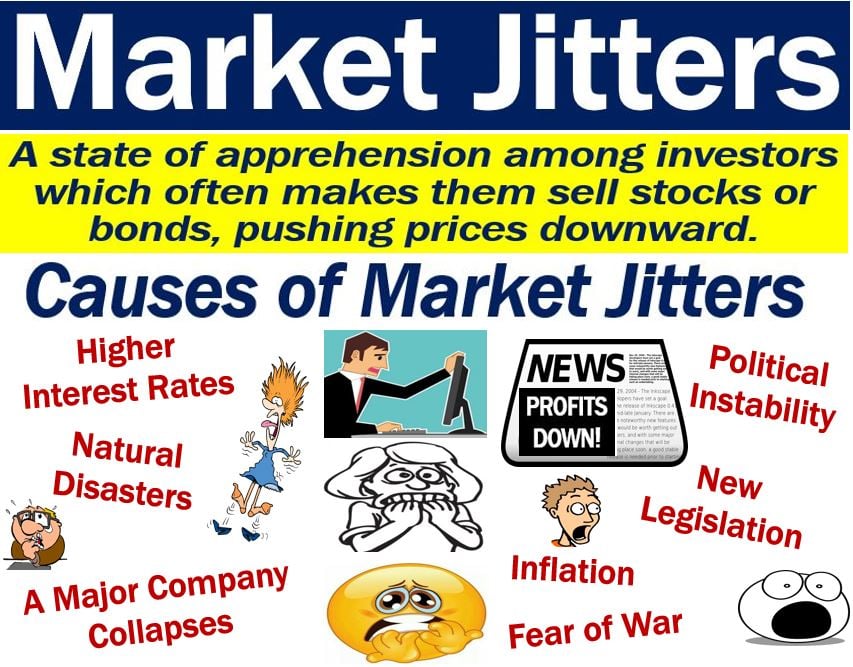Market jitters are what investors feel when they start selling stocks and bonds because they are afraid. The word ‘jitters’ means nervousness, fear, or anxiety. Market jitters, therefore, means nervousness, fear, or anxiety among investors in the market. When investors get the jitters, their actions push down prices. Sometimes their fear also triggers inaction. In other words, traders and investors don’t sell, but they stop buying because they are afraid, i.e., they freeze.
Market jitters may be the result of real or expected bad news. Earnings reports or news about interest rate changes can lead to an environment of uncertainty and apprehension in the stock market.
Certain economic indicators can also make investors and traders jittery. If I read that GDP growth has suddenly halted, I might worry about my investments. GDP stands for Gross Domestic Product.
Investing Answers says the following regarding the term on its website:
“Market jitters refers to apprehension among buyers and sellers resulting in choppy and unpredictable market performance.”
2 examples – Market Jitters vs Investor Panic
-
Greece
In 2010, Greece’s economic problems triggered market jitters across the whole of Europe and other parts of the world.
The state of apprehension among investors subsided and returned over a period of several years.
Greece and the United States have populations of 10 million and 323 million respectively. If economic problems in Greece trigger jitters internationally, one an only imagine what a crisis in the US would cause.
-
USA
Rather than causing market jitters, a major US economic crisis would probably spark worldwide panic. An economic crisis is a severe downturn in the economy.
The 2010 Flash Crash saw the Dow drop 1,000 points due to high-frequency trading and market fragmentation, erasing nearly $1 trillion in value, briefly causing investor panic (more severe than market jitters) and highlighting electronic trading vulnerabilities.
Market jitters – the business cycle
It is normal to experience anxiety and apprehension in the world of markets and investments.
Any investment portfolio carries an element of risk. A ‘portfolio‘ is a group of investment products that a person or financial institution holds or manages. Put simply; your portfolio is your spread of investments.

According to the Forex Dictionary: “Market jitters may result in a flat market with some noise, but little direction or they may result in overreaction, as in a coiled market. Generally speaking, it depends on the magnitude of events that are causing the jitters.”
If you are risk-averse, you are more susceptible to market jitters. Risk-averse investors, i.e., those not wanting to take risks, should have super-safe investment portfolios.
Risk-seeking individuals, i.e., those who love risky investments, may have less predictable investments in their portfolio.
No matter what type of investor you are, however, you should remember that markets are cyclical. That is why we have such terms as ‘market cycle‘ or ‘business cycle.’
The term ‘business cycle’ refers to alternating periods of recovery and recession. We also call it the boom-bust cycle. The business cycle is due to fluctuations in production and trade in a market economy.
Market jitters are unavoidable
If you choose to monitor your investments actively, you cannot avoid experiencing market jitters occasionally.
As the economy slows down or slides into recession, downturns in the markets are more common.
In other words, market jitters are more common during the ‘bust’ period of the business cycle.
Even if you never invest in the stock market, its performance is likely to affect your standard of living. Your pension, especially if it is a private one, relies on the long-term performance of the stock market. Pension-funds are among the world’s largest stock market investors.
Apart from influencing immediate transactions, market jitters may also have an impact on our investment strategies and retirement planning.
When there is an economic downturn, many of us change our risk tolerance by shifting towards more stable, income-generating investments. In other words, we seek safer, less risky options.
Video Explanation of Market Jitters
This video, from our sister channel on YouTube – Marketing Business Network, explains what ‘Market Jitters’ is using simple and easy-to-understand language and examples.
